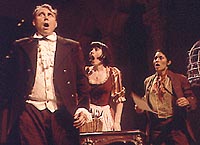
The rediscovery of Italian bel canto opera more or less passed New York by. Apart from a few significant revivals over the past 40 years, the Metropolitan has remained aloof, and such fabled divas as Callas, Caballé, Sutherland, and Sills mainly performed their bel canto specialties elsewhere. We are unlikely now to catch up on all the Rossini-Donizetti-Bellini operas that have been exhumed, but the Caramoor Festival is making a game stab. Will Crutchfield, a conductor and scholarly expert in the field, has staked out turf on the Caramoor estate in Katonah, where each summer he selects one work for careful reexamination and performance in a semi-staged production with handpicked singers and the Orchestra of St. Luke’s. This year his choice fell on Rossini’s La Gazza Ladra, first seen at La Scala, Milan, in 1817 and the composer’s most notable essay in the semi-seria genre.
Crutchfield’s succinct description of semi-seria is worth quoting: “As the name implies, this was a ‘half-serious’ form, freely employing the conventions of comic opera and its concentration on ordinary folk (as opposed to the heroes of legend and history), yet treating serious events and importing an element of pathos outside the range of such madcap escapades as those in Il Barbiere di Siviglia and L’Italiana in Algeri.” That nicely describes the general character of La Gazza Ladra, although the bizarre incident upon which the plot turns seems in fact to promise an opera full of madcap escapades. A young servant named Ninetta is accused of stealing silverware. She is tried and found guilty by the local judiciary, but just as she is to pay the ultimate penalty, the real culprit is discovered: a thieving magpie (the opera’s title character) that has a bad habit of spiriting bright objects to its nest. No snickering, please. The tale is based on a true-life event, in which the poor girl really was executed before the truth came out.
Actually, the McGuffin (as Alfred Hitchcock would have called the plot gimmick) is less important than the surprising incidents and misunderstandings it provokes, leading to a lively portrait of a typically merry opera buffa village gone slightly sour. A high-spirited but responsible and sensitive girl, Ninetta generates genuine audience sympathy, as does her father, who as an army deserter has crises of his own to deal with. Even the lecherous town mayor has a sinister side, while Ninetta’s sidekick, a peasant lad named Pippo, and her boyfriend, Giannetto, respond to the impending tragedy with a depth of concern that raises them well above the usual stock types. And of course, it’s all red meat to Rossini, whose richly inventive score blends his comic and tragic voices to make La Gazza Ladra a very special piece.
With one exception, the raw vocal material on hand for this performance was only just adequate, proving Crutchfield’s observation that without serious virtuosos in every leading role the opera cannot make its full effect. On the other hand, the cast was immaculate in matters of style, dramatic timing, and expressive declamation, achieving a level of ensemble polish and musical coherence that more-glamorous vocal personalities often fail to reach. So all the more credit to the one major singer on hand, Vivica Genaux, as Pippo, who never tried to steal the show despite the clear advantage she enjoyed in terms of vocal quality and technical agility. In the end, though, it was a pleasure simply to get better acquainted with this sparkling piece, a masterly opera of originality and immense musical charm.